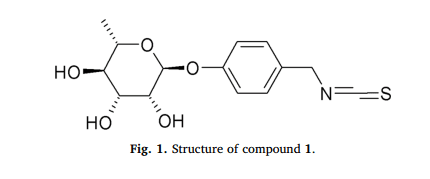Knowledge center
News
Moringa isothiocyanate-1
Moringa isothiocyanate-1 is bioaccessible and bioavailable as a stable unmodified compound
Moringa oleifera Lam. is a widely cultivated subtropical tree with a variety of documented medicinal properties. An ethanolic moringa seed extract (MSE) was shown to contain high concentrations of the stable moringa isothiocyanate-1 (MIC-1, 1). Compound 1 has anti-inflammatory and antidiabetic properties but has not been characterized metabolically. The objective of this study was to understand its bioaccessibility using a human intestinal model and bioavailability using serum from treated rats. Bioaccessibility of 1, using the TNO Intestinal Model (TIM-1), was determined to be 61% and 62% in the fasted and fed states respectively. Compound 1 from the serum of treated animals was measured directly without prior chemical or enzymatic digestion. Bioavailability and pharmacokinetic studies were conducted in Sprague-Dawley rats treated with 50 mg/kg of 1, either intravenously with pure 1, or orally gavaged with MSE or 1. Serum levels of 1 were 6 to 12 times higher in animals dosed intravenously than in animals dosed by gavage with a half-life of about 2 h. Serum levels of 1 dropped to zero between 8 and 24 h for all three treatments. These results suggest 1 remains largely unmodified during uptake, unlike other isothiocyanates, and has favorable bioaccessibility and bioavailability characteristics for a potential therapeutic agent.
1. Introduction
Moringa oleifera Lam. (moringa), also known as the ‘Drumstick tree,’ is indigenous to the South India region and known for its wide range of uses as a nutritional food and traditional medicine (Gothai et al., 2016). It is cultivated and grown in many parts of the world including tropical parts of Africa, South and Central America and Asia. Moringa leaf and seed extracts were shown to have anti-inflammatory and antidiabetic properties in vitro and in vivo (Jaja-Chimedza et al., 2018; Waterman et al., 2014, 2015). Moringa seeds have also been shown to possessantimicrobial and anti-hepatoxic properties (Padayachee and Baijnath, 2012). Moringa isothiocyanates (MICs) have been reported to reduce weight gain, insulin resistance and hepatic gluconeogenesis and improve glucose tolerance in obese mice (Jaja-Chimedza et al., 2018; Waterman et al., 2015). MICs were also shown to mitigate ulcerative colitis pathologies in a mouse model through an anti-inflammatory mechanism likely mediated through the nuclear factor erythroid 2-related factor 2 (Nrf-2) signaling pathway (Kim et al., 2017). Moringa seeds are the richest source of MIC-1 (1), and a method for producing 1–
enriched moringa seed extract has been developed (Jaja-Chimedza
et al., 2017).
Read the full article in our publication list in our Knowledge Center.




